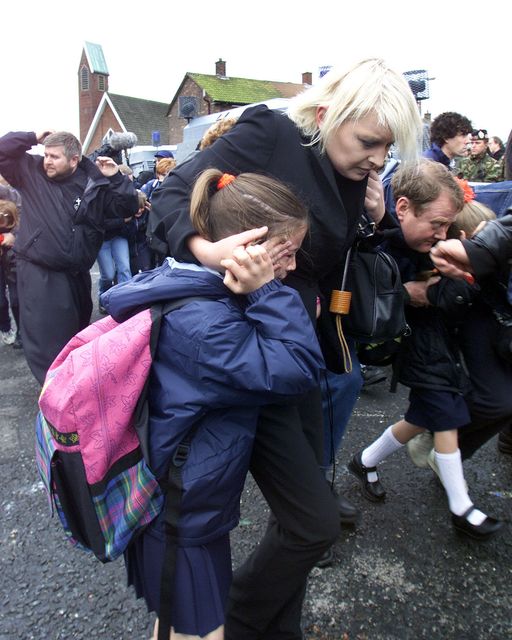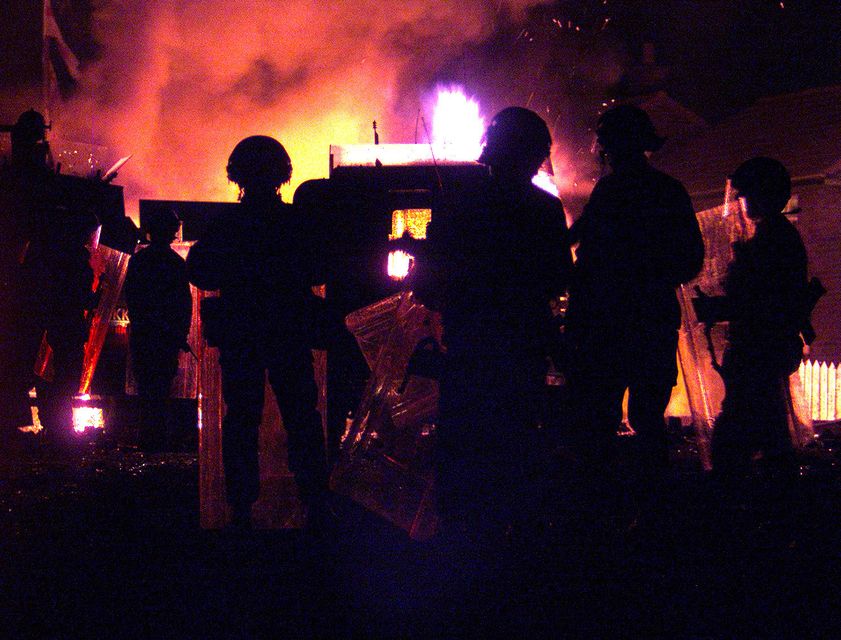A Catholic priest caught in the middle of a loyalist protest at a north Belfast school turned down an offer of accommodation from the Irish Government after receiving a death threat.
Father Aidan Troy received multiple loyalist death threats in January 2003 over his role in the Holy Cross dispute in Belfast.
The dispute in 2001 made headlines around the world as loyalist residents staged protests against Catholic families walking their children to a school in the area.
Some of the protests became violent and police in riot gear were deployed to protect the schoolgirls as they made their way to and from the school.
Fr Troy was the chairman of the board of governors of the school.
Children and parents run for cover along the Ardoyne Road in north Belfast, towards Holy Cross School (Paul Faith/PA)
In newly released documents from the Irish National Archives, he told the Department of Foreign Affairs that he had been subjected to death threats in January 2003 – a year after most of the hostilities had ceased but days after a pipe bomb had been left at the school. The device was safely diffused.
Fr Troy told officials on January 12 that he first became aware of a threat against him on January 9 when he was informed by a BBC journalist that they had received a coded warning threatening him and the board of management at the school.
A second coded warning was received by the Samaritans on January 10, where Fr Troy was informed that the charity had received a call threatening his life unless the school was closed.
The next day, police told him they had intelligence that his life was in danger from loyalist paramilitaries and that “he was to be shot before Monday”.
Fr Troy was offered full security, advised to avoid Ardoyne and to take special precautions.
He told the department that while he was concerned about the threats, he did not know how to respond to them.
Police and the Army came under attack near Holy Cross primary school in Ardoyne (Paul Faith/PA)
He said he did not wish to leave Ardoyne nor draw attention to the threat against him because of the effect it may have on the children of the school.
Tom Lynch, from the Department of Foreign Affairs, said he told Fr Troy to take the threat seriously.
He offered Fr Troy temporary accommodation in one of the apartments which the department was leasing in Belfast.
However, Mr Lynch wrote: “Having considered our offer he said he was very appreciative but that for the present he felt that he might be better residing in the monastery in Ardoyne.”
Fr Troy said if he needed to move urgently he would contact the department.
Mr Lynch said he contacted British officials who made arrangements with the police to “respond promptly” to any security requests from the priest.
Fr Troy later said he was threatened again, telling the Forum for Peace and Reconciliation in Dublin that police officers had told him of another threat against his life.
On January 22, he said: “The most recent threat relayed to me by the PSNI told me I would be killed within two days.”
Father Troy also said the planting of a device earlier that month at the school gate had a “devastating effect” on pupils, with some dropping out of class and others regressing in terms of the therapy they received.
He added: “I do not blame the people of the (loyalist) Glenbryn area for these messages.
“It takes only one sick mind or a perverted person to create fear, intimidation and a form of terrorism.”
He paid tribute to his “wonderful staff of dedicated teachers”, and he insisted: “There are no plans to close the school.
“To force it to close as a result of intimidation would be an absolute tragedy.”
– This article is based on documents in 2024/130/6

